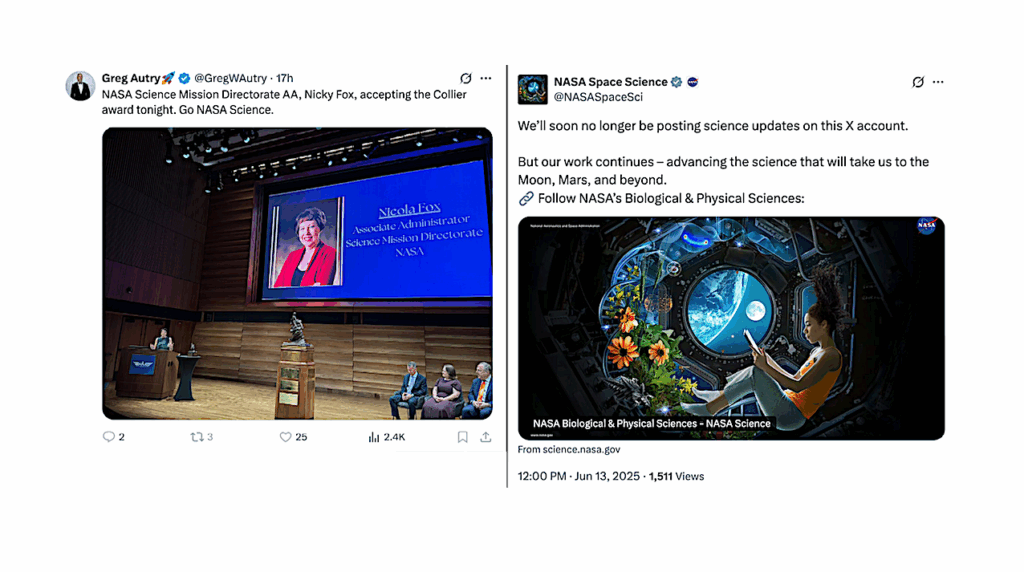Getting Ready for OCO-2
 NASA Prepares to Launch Orbiting Carbon Observatory-2
NASA Prepares to Launch Orbiting Carbon Observatory-2
The spacecraft will sample the global geographic distribution of the sources and sinks of carbon dioxide and allow scientists to study their changes over time more completely than can be done with any existing data. Since 2009, Earth scientists have been preparing for OCO-2 by taking advantage of observations from the Japanese GOSAT satellite. OCO-2 replaces a nearly identical NASA spacecraft lost because of a rocket launch mishap in February 2009.
NASA Releases Orbiting Carbon Observatory Accident Summary, earlier post
“A NASA panel that investigated the unsuccessful Feb. 24 launch of the Orbiting Carbon Observatory, or OCO, has completed its report.”









Get that thing up there! It’s good to hear they’ve already been working with some data that’s available.
A surplus Delta II will launch OCO. So are NASA spacecraft also exclusive to ULA rockets or can Antares and Falcon 9 be considered – ever?
Spacecraft themselves aren’t usually designed with a specific booster rocket in mind. exceptions would be larger satellites, which must use a more powerful rocket to launch them and they also must fit within the largest aerodynamic fairing that a rocket has. however, even for smaller satellites, the mounting structures that are used to attach a satellite to the rocket is booster-specific, though. so at the very least, you’d need to design a new mating adapter to connect the spacecraft to a different rocket. but given that, and assuming it would fit within the aerodynamic fairing of a Falcon or Antares, sure, they could launch it.
Note – the OCO-2 WAS, in fact, originally going to be launched by Orbital’s Taurus XL. the decision to change that to a Delta II was made back in 2012.
Actually, there are launch vibration issues which are different for different vehicles. That affects the mechanical design of the spacecraft. So switching launch vehicles does involve nontrivial redesign.
excellent point.
Way more than just vibration issues. Read the payload guide for the launchers that are available, and you’ll see thermal environment, power supply and other things. Designing for one launcher is much cheaper and often done, especially if its not a “standard” bus spacecraft.
Did that change involve tooling a new mating adapter? Is every flight and payload/rocket combination unique?
it would have to have involved making a new mating adapter, and yes. the only exceptions would be with satellite families that use the same rocket booster for launch every time. they could use a “standard” design.
Changed to Delta because Orbital’s Taurus XL failed twice in a row to deploy NASA research satellites (OCO and Glory).
Hug Doug – Soory, but your statement is incorrect: “Spacecraft themselves aren’t usually designed with a specific booster rocket in mind”
Spacecraft are ABSOULTELY designed with the booster in mind. Launch loads, vibration, acoustic, thermal, and even RF emissions & suscpetibility are all different with the various launch vehicles.
If I build and test my satellite assuming an Atlas launch, can I just stick it on a Delta II?? – No.
Will it work? – Maybe, but the massive amount of analysis requried might just cost more than repeating the environmental tests to qualify the payload for the new mission.
fair point. I can see that it is certainly a much more important design consideration than I had first thought.
however, we do have here an example of a satellite switching launch vehicles, in this case, from a Taurus XL to the Delta II. a google search does bring up a few other examples of satellites that have switched launch vehicles as well.
naturally, and i did say this, there would be significant costs incurred in re-designing the mating adapter, and naturally you would want to make sure that the satellite itself could handle the different stressses from the environment of a different launch vehicle.
so while there’s definitely expense involved, perhaps significant expense, we do know it’s possible to switch launch providers.
COBE satellite was supposed to launch on the shuttle but the Challenger explosion required redesign to fit on a Delta
here is a link to a case study:
http://orion.asu.edu/Additi…
Interesting! The booster wasn’t even mentioned on the NASA website when I checked. Is this the last Delta II? Friends who worked on that program were sorely disappointed when ULA cancelled it, since they had worked hard to minimize costs and the booster was much less expensive than the Delta IV.
Republicans in Congress hate this carbon tracking satellite. And we can be sure that the Koch brothers did not help fund it.
In every Congressional hearing I have watched almost all of the Republicans consistently attacked NASA for studying climate change. This isn’t about policy or response. This is about getting the facts, and they don’t want us to have the facts. When I called Congressman Posey’s office I was told he opposed full funding for Commercial Crew because “if NASA stopped spending on climate research there would be plenty of money”. I can’t imagine a more important NASA program than collecting accurate data on climate change, which affects the lives of billions. I can’t imaging a less important NASA program than SLS/Orion, which affects the lives of a few thousand contractors and three or four senators.
When someone is against facts, that’s when you know their intentions are malevolent.
I hope it launches successfully, the last 2 OCOs did not. If Orbital is still doing this and fails again then it should not get a fourth chance.
If this one fails we would have to suspect sabotage.
The lovely thing about conspiracy theories is that you can spin them both ways! The climate change zealots sabotaged it because they knew it would not show significant increases in CO2. No! The climate deniers sabotaged it because the mission would show climate change is worse than we thought.
The truth,of course, is even better. Obama’s long lost cousin sabotage the mission because it would allow NASA to determine that he was married to Bush’s illegitimate daughter. 😀
What was the cause of these failures??
Any chance Obama’s cousin got hired by Spacex??
in the article it states that the launch is being done with a Delta II
Only one OCO did not launch successfully, the original OCO. The second failure you allude to is Glory. Also note that although Orbital was involved in both the launch and the satellite, NASA procures the services separately from two different groups at Orbital.
So, indeed, after two Taurus XL failures, Orbital was not given a “third” change and OCO-2 will be launched by a Delta 2. The OCO-2 spacecraft itself, though, WAS build again by Orbital. This reduced the amount of redesign required and provided the greatest savings to the taxpayer. The original OCO was a fairly smooth program and did not have any major technical issues, so there was no reason to “punish” the spacecraft side of Orbital and award the replacement to somebody else.
Thanks Spaceman for clearing that up! I just remember being frustrated at the loss of two climate and weather observation satellites.